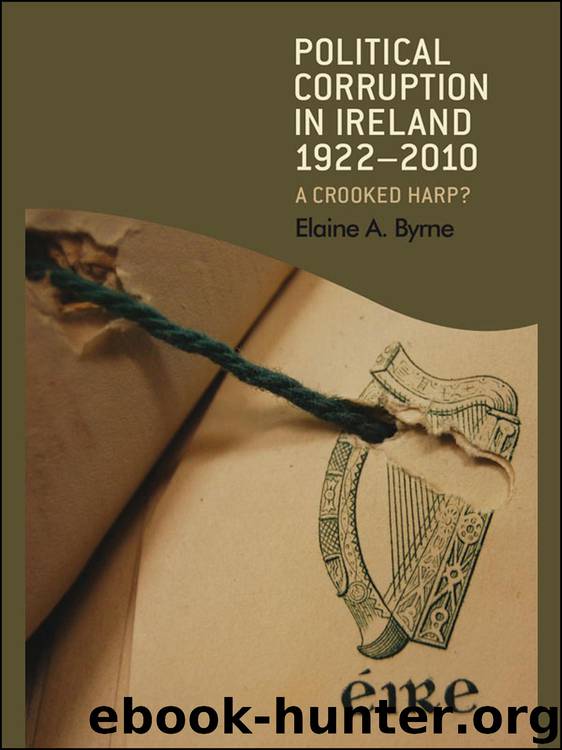Political corruption in Ireland, 1922–2010 by ELAINE A. BYRNE

Author:ELAINE A. BYRNE
Language: eng
Format: mobi
Publisher: Manchester University Press
Published: 2012-05-10T16:00:00+00:00
Conclusion
In an 1859 lecture entitled ‘Self-Made Men’ the great Black American leader, Frederick Douglass, asserted that self-made men ‘owe little or nothing to birth, relationship, friendly surroundings; to wealth inherited or to early approved means of education; who are what they are, without the aid of any of the favouring conditions by which other men usually rise in the world and achieve great results’.126 In that respect, Goodman was the Douglass archetype, a man who defied the expectations of his class in a country where the social hierarchy of ‘knowing your place’ was ever so subtlety defined.
The newly educated and entrepreneurial Irish were aggrieved that the confines of social class prohibited them from achieving their full potential and due recognition that social progress afforded.127 Since independence, the English and the Protestant ascendancy had now been replaced by the upper middle-class Catholics who dominated the professions, particularly banking and accountancy. Access to, and ascent within, the professions was perceived as bound by discernible privilege. The conventions of class status did not readily embrace new applicants which may account for why so many of the successful Irish business enterprises from the 1960s were populated by self-made men. In popular political parlance, they were known, somewhat dismissively and contemptuously, as the mohair suit brigade. Many of them shared the belief that the very virtue of overcoming the hurdles of perceived class prejudice, united them against the establishment to which they nonetheless yearned to belong.
Charles Haughey and Albert Reynolds would have recognised themselves in Goodman’s rising success and shared a mutual sense of deferential admiration towards the beef baron and self-made men like Dermot Desmond and Michael Smurfit. Those that entered politics in the late 1950s and 1960s were characterised by an absence of any pre-political resources in terms of financial security, prestige or power. Although they came from modest social backgrounds and in many cases had minimal professional qualifications (although Haughey had a first class honours degree in commerce at University College Dublin and later qualified as a chartered accountant), emphasis in general was placed on the entrepreneurial ethic as opposed to the merits of formal education and professional certificates. Haughey’s insecurity was his greatest flaw according to Geraldine Kennedy, Irish Times: ‘What he wanted most of all was to be seen to be respectable and he thought he could buy that – and he couldn’t, in that Ireland.’128 These justifications were echoed when sustained scandal hit Haughey in the late 1990s. In an interview with the Sunday Business Post in 1998, Patrick Gallagher, son of the property developer and builder Matt Gallagher, revealed a genuine belief that business involvement with Taca was part of a movement which would create a more prosperous Ireland. ‘Haughey was financed in order to create the environment which the Anglo-Irish had enjoyed and that we as a people could never aspire to.’129 Haughey’s fabulous lifestyle was initially due to the generosity of Matt Gallagher who was motivated by the sincerely held belief that ‘Fianna Fáil was good for builders and builders were good for Fianna Fáil, and there was nothing wrong with that’.
Download
This site does not store any files on its server. We only index and link to content provided by other sites. Please contact the content providers to delete copyright contents if any and email us, we'll remove relevant links or contents immediately.
| Africa | Americas |
| Arctic & Antarctica | Asia |
| Australia & Oceania | Europe |
| Middle East | Russia |
| United States | World |
| Ancient Civilizations | Military |
| Historical Study & Educational Resources |
Room 212 by Kate Stewart(5105)
The Crown by Robert Lacey(4807)
Endurance: Shackleton's Incredible Voyage by Alfred Lansing(4769)
The Iron Duke by The Iron Duke(4349)
The Rape of Nanking by Iris Chang(4203)
Joan of Arc by Mary Gordon(4101)
Killing England by Bill O'Reilly(3995)
Say Nothing by Patrick Radden Keefe(3975)
I'll Give You the Sun by Jandy Nelson(3428)
Shadow of Night by Deborah Harkness(3359)
Hitler's Monsters by Eric Kurlander(3328)
Mary, Queen of Scots, and the Murder of Lord Darnley by Alison Weir(3200)
Blood and Sand by Alex Von Tunzelmann(3195)
Eleanor & Park by Rainbow Rowell(3152)
Darkest Hour by Anthony McCarten(3119)
Margaret Thatcher: The Autobiography by Thatcher Margaret(3079)
Book of Life by Deborah Harkness(2931)
Red Famine: Stalin's War on Ukraine by Anne Applebaum(2928)
The One Memory of Flora Banks by Emily Barr(2857)
